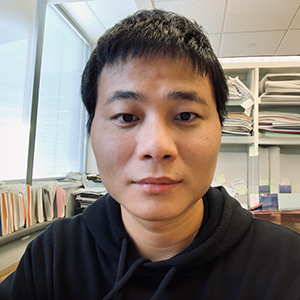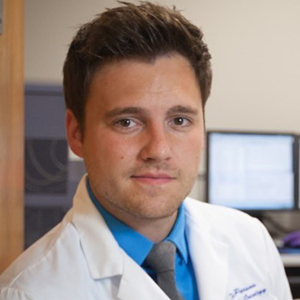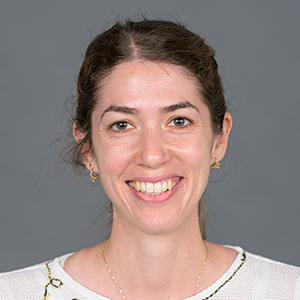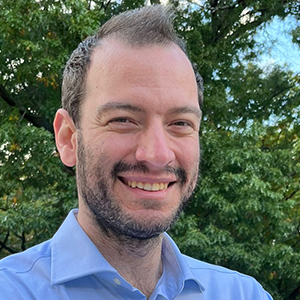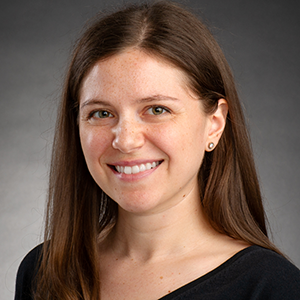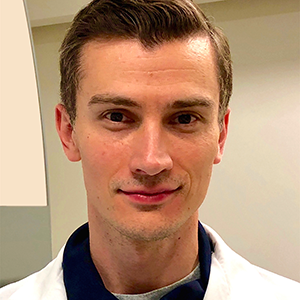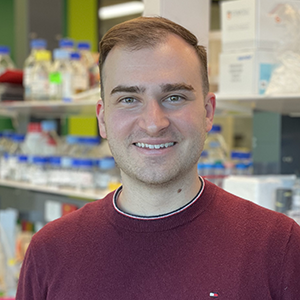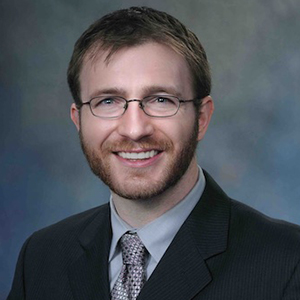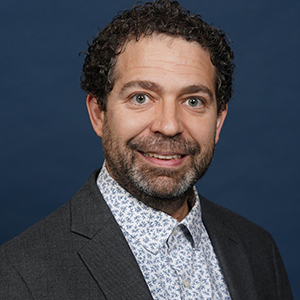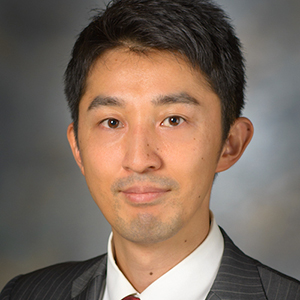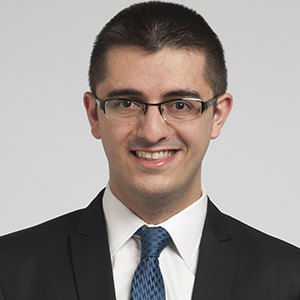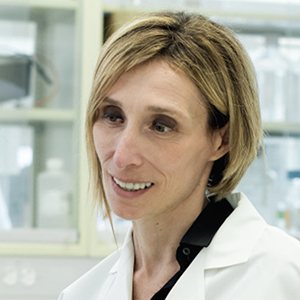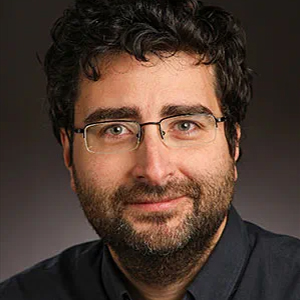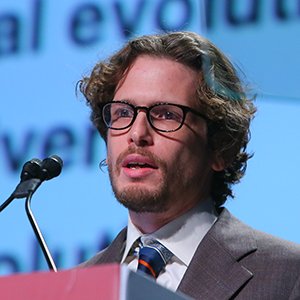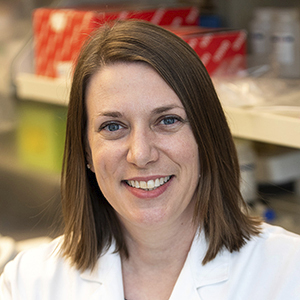Research We Fund
With hundreds of projects currently underway, we fund scientists through our academic grant programs and biotech partners through our strategic venture philanthropy initiative. Use the filters below to find an LLS-funded project.
For a better viewing experience, please use a larger device.
The Role of the DNA Sensor AIM2 in B Cell Fate and Function After HCT
Altered B cell homeostasis plays a key role in the development of chronic graft-vs-host-disease (cGVHD) after hematopoietic stem cell transplantation (HCT). We hypothesize that the DNA sensor AIM2 plays a critical role in the fate of BCR-activated B cells after HCT. We will utilize novel mouse models to investigate AIM2-BCR modulation with clear translational implications in autoreactivity perpetuating cGVHD as well as functional humoral deficiency and vaccine hyporesponsiveness after HCT.
Program: Career Development ProgramProject Term: Start Date: July 1, 2024 End Date: June 30, 2027
Spatial architecture and malignant cell characterization of nodular lymphocyte-predominant Hodgkin lymphoma
Nodular lymphocyte-predominant Hodgkin lymphoma is recognized as a disease entity in a spectrum of related diseases, including T-cell rich B-cell lymphoma. Although treatments are generally effective, a subset of patients suffers from lymphoma progression and aggressive disease transformations. Here, we propose to analyze clonal evolution of tumor cells and describe the spatial architecture of tissues with the goal to improve molecular classification and develop novel therapeutic approaches.
Program: Career Development ProgramProject Term: Start Date: July 1, 2024 End Date: June 30, 2026
Targeting Myeloid Malignancies through IRAK4 Synthetic Lethality Dependencies
Based on our preliminary data, we hypothesize that IRAK4 inhibition leads to LSPC reprogramming in MDS and AML. Aim 1 will evaluate the mechanism by which IRAK4 inhibition leads to LSPC reprogramming in cell lines, mice, and PDX samples. Aim 2 will concentrate on understanding of how IRAK4 inhibition creates synthetic lethal dependencies with the CELMoD CC-885 and how neosubstrates of CC-885 mediate the synergy upon IRAK4 inhibition in leukemic cells.
Program: Career Development ProgramProject Term: Start Date: July 1, 2024 End Date: June 30, 2027
Harnessing METTL3 inhibition in acute megakaryoblastic leukemia driven by the t(1;22) fusion involving a member of the m6A writer complex
I want to understand how the t(1;22) translocation that involves a member of the m6A writer complex drives acute megakaryoblastic leukemia (AMKL). To identify culprit genes and pathways I will use multi-omics, including RNA, eCLIP, and TimeLapse Seq and proteomics. I will dissect the RBM15-MKL specific effects of a novel METTL3 inhibitor in primary murine and human AMKL in vitro and in vivo. My ultimate goal is to cure this rare infant leukemia by harnessing METTL3 inhibition.
Program: Career Development ProgramProject Term: Start Date: July 1, 2024 End Date: June 30, 2026
Understanding How Hematopoietic Developmental State Determines Oncogenic KMT2A Fusion Formation and Leukemic Potential
My goal is to understand how cancer-associated gene fusions arise and cause disease. Specifically, I am studying how oncogenic fusions involving the gene KMT2A arise in different hematopoietic cell-types and how developmental context drives the development of leukemia. My long-term goals are to leverage an increased fundamental understanding of leukemogenesis provided by this research to improve treatment and lengthen lifespan for patients with KMT2A fusion-driven leukemias.
Program: Career Development ProgramProject Term: Start Date: July 1, 2024 End Date: June 30, 2027

Ana Vujovic, PhD
University of Colorado Denver, Anschutz Medical Campus
Denver, ColoradoInvestigating the dependency for protein synthesis in Venetoclax/Azacitidine-resistant acute myeloid leukemia
Relapsed and/or refractory acute myeloid leukemia (AML) display resistance to Venetoclax and Azacitidine (Ven/Aza) with approximately one third of patients demonstrating upregulated protein synthesis. This proposal will investigate the mechanism(s) underlying the dependence of Ven/Aza-resistant AML on protein synthesis as well as the functional consequences of targeting this pathway. Successful completion of these studies will provide novel insights into Ven/Aza resistance mechanisms.
Program: Career Development ProgramProject Term: Start Date: July 1, 2024 End Date: June 30, 2027
Functionalizing novel PHIP variants in ancestry specific Acute Myeloid Leukemia
AML risk stratification established by previous studies do not reflect survival outcomes observed in Black patients. Exome sequencing of 100 Black AML patients revealed the novel variants previously not affiliated with AML, including PHIP. Using multiomic patient sample captures and GEMMs, we will functionalize variants in PHIP and assess if they drive leukemogenesis and/or therapy resistance. The overall goal of this work is to implement inclusive genetic assessment tools for AML diagnosis.
Program: Career Development ProgramProject Term: Start Date: July 1, 2024 End Date: June 30, 2027
Targeting SF3B1 splicing factor mutant myeloid malignancies through dependency on GPATCH8
Mutations in RNA splicing factors, particularly those involving the core splicing factor SF3B1 are amongst the most common mutations found in myeloid neoplasms. We recently identified a cofactor protein known as GPATCH8 which is required for the aberrant function of mutant SF3B1. We now seek to understand and target the ways in which GPATCH8 and SF3B1 interact. In so doing we hope to develop new treatments for leukemias containing mutant splicing factors.
Program: Career Development ProgramProject Term: Start Date: July 1, 2024 End Date: June 30, 2027
Uncovering MGA-driven epigenetic reprogramming in Richter's syndrome
Richter’s syndrome (RS) is a critical complication of chronic lymphocytic leukemia. RS patients are refractory to most existing therapies and show a median survival of ~12 months. I aim to dissect the function of a frequently mutated gene in RS (i.e., MGA) through cutting-edge single-cell analyses of patient samples and mouse models. The objective of these studies is to understand transformation biology, unravel novel therapeutic vulnerabilities, and provide the basis for personalized therapy.
Program: Career Development ProgramProject Term: Start Date: July 1, 2024 End Date: June 30, 2027
Cotargeting oncogenic protein translation and apoptosis in acute myeloid leukemia
The focus of my research is to evaluate the efficacy of and to unravel the molecular mechanisms underpinning a novel drug combination in AML targeting oncogenic protein translation and apoptosis. We will utilize genetic perturbation and other orthogonal approaches, including in vitro and ex vivo assays, and in vivo AML PDX models. The goal of my research is to transform the clinical management of AML patients, particularly for relapsed and difficult-to-treat subgroups.
Program: Career Development ProgramProject Term: Start Date: July 1, 2024 End Date: June 30, 2026
Targeting the cell surface U5 snRNP complex as a novel immunotherapy for AML
A major limitation of immunotherapy approaches for AML has been the lack of known targetable cell surface antigens specific to AML cells. This project characterizes the pathologic and biologic effects of a novel cell surface antigen complex uniquely present on AML cells but not normal hematopoietic precursors, known as the U5 snRNP complex. Furthermore, we will interrogates U5 snRNP complex components as novel AML-associated antigens and CAR T cells targets for AML treatment.
Program: Career Development ProgramProject Term: Start Date: July 1, 2024 End Date: June 30, 2027
Prevention of antigen escape by modulation of off-target tumor killing in T cells
T-cell mediated therapies are all impeded by the same cause- tumoral antigen (Ag) escape: rare Ag– cells in tumors survive the initial attack and lead to relapse. We recently took an innovative approach by enhancing T cells' ability to attack the Ag- cells during the initial treatment. That process is modular by pharmaceutical intervention.
The proposed project will analyze cryopreserved excisional B-NHL biopsies to identify possible pharmaceutical targets potentiating their 'vulnerability’.
Program: Career Development ProgramProject Term: Start Date: July 1, 2024 End Date: June 30, 2026
Novel Immunotherapy Combinations in Relapsed, Refractory Mantle Cell Lymphoma
We are evaluating two parallel clinical trials with synergistic immunotherapies in mantle cell lymphoma (MCL), including 1) tafasitamab and lenalidomide and 2) glofitamab and lenalidomide. We will investigate how these treatments impact the MCL immune microenvironment and mediate anti-tumor immune responses, and will correlate these changes with outcome.
Our goal is to develop safe, effective, and "off-the-shelf" immunotherapies to improve outcomes for patients with relapsed, refractory MCL.
Program: Career Development ProgramProject Term: Start Date: July 1, 2024 End Date: June 30, 2029
Understanding the role of Metabolic Regulator SIRT5 in Acute Lymphoblastic Leukemia
SIRT5 is a master regulator of central energy metabolism. The survival and growth of Acute Myeloid Leukemia (AML) cells depend on SIRT5. I will employ genetic SIRT5 disruption and small molecule inhibitors to target SIRT5 in Acute Lymphoblastic Leukemia (ALL) cells and primary samples. This study aims to 1) determine the effects of SIRT5 inhibition on ALL in vitro and in vivo, and 2) identify SIRT5-regulated pathways and mechanisms underlying SIRT5 dependency in T-ALL.
Program: Career Development ProgramProject Term: Start Date: July 1, 2024 End Date: June 30, 2026
Mechanisms of oncogenic transcription in NPM1-mutant myeloid leukemia
NPM1-mutated leukemia is the most common AML in adult and characterized by upregulations of HOXA/B genes and MEIS1. Given the importance of oncogenic transcriptional program, I will determine regulatory molecules that cooperate with mutant NPM1 on chromatin by combining CRISPR/Cas9 screening approach in an innovative model system of endogenous transcription reporters with proteomics approach. This will facilitate identification of novel therapeutic targets specific for NPM1-mutated AML.
Program: Career Development ProgramProject Term: Start Date: July 1, 2024 End Date: June 30, 2026
Glycotyping as a novel approach to study leukemia stem cell heterogeneity and function
Leukemia stem cells (LSCs) are highly heterogeneous populations and key contributors to AML progression. Here, I aim to employ heparan sulfate (HS) glycotyping to resolve LSC heterogeneity. Using complementary genetic and antibody-based approaches, I will delineate the functional roles of HS pathway during AML progression. The newer insights provided by these studies could potentially uncover novel LSC therapies and facilitate diverse training for me to become an independent leukemia researcher.
Program: Career Development ProgramProject Term: Start Date: July 1, 2024 End Date: June 30, 2026
Patient-Reported Outcomes and Survivorship in Histiocytic Neoplasms
Advances in the treatment of Langerhans cell histiocytosis and Erdheim-Chester disease have led to a growing survivor population; however, there is a lack of information regarding the long-term outcomes, healthcare needs, and health-related quality of life in the era of targeted therapies. We propose the creation of a large national cohort of survivors with histiocytosis to address unanswered questions, eventually leading to targeted survivorship programs for this vulnerable population.
Program: Career Development ProgramProject Term: Start Date: July 1, 2024 End Date: June 30, 2029
TCR-like CARs targeting GvL mHAgs for the treatment of post-transplant AML relapse
AML recurrence is a devastating event after allo-HCT. I hypothesize that it could be counteracted through targeting of leukemia-restricted mHAgs via TCR-like CARs. I will identify scFVs recognizing mHAg:HLA complexes using a cell-free nanobody screening platform, and test the anti-leukemia activity and safety of CAR-Ts bearing such scFVs in vitro and in vivo. Through this approach, I will build a library of CAR constructs able to provide population-scale coverage for at-risk allo-HCT patients.
Program: Career Development ProgramProject Term: Start Date: July 1, 2024 End Date: June 30, 2026
Role of ID2 in mature T-cell lymphoma
Overexpression of ID2 is a recurrent event in mature T-cell lymphoma (TCL), and its significance is yet to be established. We will use a multidisciplinary approach combining epigenetic, transcriptomic, and proteomic analysis in human and murine models to identify the mechanisms leading to ID2 overexpression and their effect on T-cell transformation. Our goal is to define the role of ID2 in lymphomagenesis and determine its potential as a novel therapeutic target in TCL.
Program: Career Development ProgramProject Term: Start Date: July 1, 2024 End Date: June 30, 2026
Improving outcomes with immune therapies for multiple myeloma
The primary focus of research is to better understand mechanisms of resistance to immunotherapies and design treatment approaches to improve outcomes. I hope to accomplish this by conducting clinical trials that concurrently target both BCMA and GPRC5D in patients with advanced multiple myeloma and by studying antigen expression, tumor genetics, and T cell characteristics to better understand mechanisms of resistance. The goal is to develop more effective immune treatments for myeloma.
Program: Career Development ProgramProject Term: Start Date: July 1, 2024 End Date: June 30, 2029
Multiple Myeloma Support from the Microenvironment: Bone Marrow Adipocytes and the Fatty Acid Binding Proteins
Our project’s goal is to change how multiple myeloma is understood and treated by interrogating a novel part of the cellular “soil” (the bone marrow adipocyte), in which myeloma cells, or “seeds”, land and grow. We will discover new forms of cancer drug resistance that are driven by adipocyte-derived factors and the fatty acid binding proteins. This work will expose new ways to overcome drug resistance to improve survival and quality of life for myeloma and other hematological cancer patients.
Program: Career Development ProgramProject Term: Start Date: July 1, 2024 End Date: June 30, 2029
Epigenetic heterogeneity in age-related clonal hematopoiesis and acute myeloid leukemia
Our focus is to unravel how clonal hematopoiesis (CH) progresses to leukemia. We will investigate how epigenetic heterogeneity affects Tet2-mutant hematopoietic stem cells (HSCs) during aging. We plan to simultaneously trace HSC clonal identity and clonal history by genetic barcode and single-cell multi-omics and determine their epigenetic configurations adaptive in the aged, inflammatory bone marrow. The long-term goal is to create innovative therapeutics to mitigate CH and prolong health span.
Program: Career Development ProgramProject Term: Start Date: July 1, 2024 End Date: June 30, 2029
Novel targeted therapies for acute myeloid leukaemia and multiple myeloma
Outcomes for acute myeloid leukemia (AML) and multiple myeloma (MM) patients remain inadequate and new treatment options to combat resistance against existing agents are urgently needed. My research aims to identify and target selective vulnerabilities of AML and MM cells. I am particularly interested in epigenetic and metabolic pathways that control self-renewal and differentiation of hematopoietic cells and that can be leveraged to modulate cell fate for therapeutic benefit.
Program: Career Development ProgramProject Term: Start Date: July 1, 2024 End Date: June 30, 2029
Uncovering mechanisms of DNMT3A stability in hematologic malignancies
DNMT3A is a critical tumor suppressor in hematologic malignancies; DNMT3A protein levels affect both tumor latency and type. DNMT3A is regulated in part by protein stability, but the mechanisms remain incompletely understood. Here, I will dissect the mechanisms that regulate DNMT3A protein turnover using CRISPR screening and genetically engineered mouse leukemia models. This work will reveal whether its stabilization could contribute to a new therapeutic approach for hematologic malignancies.
Program: Career Development ProgramProject Term: Start Date: July 1, 2023 End Date: June 30, 2026

Jessica Stewart, PhD
UNC Lineberger Comprehensive Cancer Center
Chapel Hill, North CarolinaElucidating the role of FAM72A in EBV-driven B cell lymphomagenesis
This work focuses on characterizing the role of FAM72A in EBV-driven B cell tumorigenesis. This protein is upregulated by EBV during the transformation of B cells and overexpressed in many hematologic cancers. Using a combination of in vitro and in vivo EBV transformation models, high-throughput drug screens, and structural analysis we aim to find small molecules inhibitors that target FAM72A and determine if these drugs can prevent or hinder EBV-associated B cell malignancies.
Program: Career Development ProgramProject Term: Start Date: July 1, 2023 End Date: June 30, 2026
Mechanisms of Clonal Evolution in the Transformation of MPN to sAML
This research will investigate blood stem cell mutations associated with progression of myeloproliferative neoplasm (MPN) to secondary acute myeloid leukemia (sAML). Our preliminary data suggest that pre-leukemic cells with particular mutations may have a selective advantage in a background of certain MPN subtypes. We will confirm this by utilizing mouse models and both MPN and sAML primary patient samples. Ultimately, we will examine and test inhibition of mechanisms which drive MPN to sAML.
Program: Career Development ProgramProject Term: Start Date: July 1, 2023 End Date: June 30, 2026
Characterization and Targeting of Tumor-Associated Monocytes/ Macrophages that Limit the Efficacy of PD-1 Blockade in Lymphoma
Inhibition of the PD-1 exhaustion pathway enables the immune system to attack cancers. PD-1 blockade is now a standard treatment for relapsed classic Hodgkin Lymphoma (cHL) and a component of experimental frontline therapy. In patients with cHL, a newly identified population of monocytes/macrophages limits the efficacy of PD-1 blockade. We will characterize and target these tumor-programmed monocytes/macrophages for therapeutic benefit in patients with cHL and other lymphoid malignancies.
Program: Career Development ProgramProject Term: Start Date: July 1, 2023 End Date: June 30, 2026
The microbiome-induced immune response role in bronchiolitis obliterans syndrome following allogeneic hematopoietic cell transplantation
The microbiome is increasingly recognized as contributing to chronic graft-versus-host disease (cGVHD). I hypothesize that microbial antigens drive the devastating complication of bronchiolitis obliterans syndrome (BOS). To determine if such antigen targets are at the heart of BOS pathology, I will integrate spatial transcriptomic approaches, immunopeptidome analysis, and direct antigen specificity testing of TCRs from biospecimens collected from preclinical models and patient biospecimens.
Program: Career Development ProgramProject Term: Start Date: July 1, 2023 End Date: June 30, 2026
Bone Marrow Stromal Cell Senescence Induced by Dnmt3a-Mutant Hematopoiesis Drives Clonal Hematopoiesis and Transformation to Myeloid Malignancy
This project focuses on how age-associated clonal hematopoiesis (CH) alters the bone marrow (BM) microenvironment, and whether this promotes transformation of CH to acute myeloid leukemia (AML). I will utilize single cell RNA-seq data, genetic knockout models, and targeted inhibitors to perturb the non-hematopoietic and hematopoietic compartments of a mouse model of CH. The goal is to determine if manipulation of the BM microenvironment can attenuate CH and prevent AML transformation.
Program: Career Development ProgramProject Term: Start Date: July 1, 2023 End Date: June 30, 2026
Identification and characterization of genetic factors affecting MLL/KMT2A fusion proteins stability in MLL/KMT2A rearranged leukemias
MLL1/KMT2A rearranged leukemias are the most common blood cancer occurring in children characterized by dismal prognosis. Given the importance of fusion proteins in driving the disease, I will determine factors affecting the fusion protein stability through a CRISPR/Cas9 screening approach in an innovative model system where the MLL fusions are endogenously tagged with a fluorescent protein. This will facilitate development of molecular glue degraders specifically targeting the MLL fusions.
Program: Career Development ProgramProject Term: Start Date: July 1, 2023 End Date: June 30, 2026
Identifying novel regulators of leukemic progression in GATA2-deficiency syndrome
GATA2 deficiency is an inherited pediatric syndrome with a high rate of progression to myeloid malignancy, the mechanisms of which remain largely undefined. Here, we will use our recently generated mouse model, Gata2R396Q, to determine the effects of GATA2 deficiency on hematopoietic function and identify novel drivers of myeloid malignancy via focused CRISPR screens. Our work will provide further insight into the mechanisms driving leukemic progression of this syndrome.
Program: Career Development ProgramProject Term: Start Date: July 1, 2023 End Date: June 30, 2026
An integrated liquid biopsy framework for surveillance of residual disease and host immune status of T-cell lymphomas
I aim to develop an accurate disease monitoring system and identify immunologic determinants of development and progression in T-cell lymphoma (TCL). I will integrate noninvasive liquid biopsy methods by high-throughput sequencing. I will study blood samples at various milestones, including pre-diagnostic, diagnostic/baseline, and post-treatment specimens during the natural history of TCL. Using these novel tools and unique specimens, my goal is the development of effective therapies for TCL.
Program: Career Development ProgramProject Term: Start Date: July 1, 2023 End Date: June 30, 2025
Molecular basis and new therapeutic strategies in lineage ambiguous leukemia
Lineage-ambiguous leukemias are high-risk blood cancers with unclear biologic basis and suboptimal treatment options. Here, I will identify the cell of origin of lineage ambiguous leukemia and investigate new therapeutic strategies through in vitro and in vivo experimental modeling approaches and preclinical drug studies in patient-derived xenografts. These studies will clarify the cellular and molecular alterations driving lineage ambiguity and advance a new, rational therapeutic approach.
Program: Career Development ProgramProject Term: Start Date: July 1, 2023 End Date: June 30, 2025
Deciphering the role of p53 signaling in NPM1-mutant AML
NPM1c and TP53 mutations are exclusive in acute myeloid leukemia (AML) despite both being commonly present in patients, suggesting a fitness disadvantage for cells with co-occurring mutations. However, the mechanisms underlying this exclusivity have not been explored. This project will utilize novel models to dissect the importance of TP53 signaling in NPM1c+ (pre)-leukemic stem cells. Generated results may highlight therapeutic opportunities for improved risk management of NPM1c+ AML patients.
Program: Career Development ProgramProject Term: Start Date: July 1, 2023 End Date: June 30, 2025

Yiman Liu, PhD
Perelman School of Medicine at the University of Pennsylvania
Philadelphia, PennsylvaniaInvestigating the impact of hotspot mutations in a chromatin reader on leukemogenesis
The goal of this proposal is to investigate the consequence of the chromatin reader eleven-nineteen-leukemia (ENL) gain-of-function mutations in the pathogenesis of leukemia. Our studies leverage the expertise in the molecular and chromatin biology of chromatin reader in leukemia utilizing mouse model, high resolution image, epigenomic and transcriptomic approaches. Our goal is to understand how chromatin reader contributes to cancer development, progression, and therapeutic outcome.
Program: Career Development ProgramProject Term: Start Date: July 1, 2023 End Date: June 30, 2025
Investigating the role of preleukemia duration and clonal burden in progression to AML
The development of acute myeloid leukemia (AML) is preceded by a “preleukemic” phase in which mutated hematopoietic stem cells expand due to a fitness advantage. Our work uses prospective models and analysis of patient samples to study how the duration of preleukemia and how the preleukemic clonal burden affect progression to AML. Results of our studies will shed new light on AML pathogenesis and help guide clinical management of preleukemic conditions such as clonal hematopoiesis.
Program: Career Development ProgramProject Term: Start Date: July 1, 2023 End Date: June 30, 2026
Therapeutically actionable molecular safeguards in leukemic stem cells
Our research program’s goal is to identify therapeutically actionable pathways in pre-leukemic and leukemic stem cells in myeloid malignancies. We specifically dissect molecular circuits governing stem cell self-renewal and differentiation, how these change during aging, and contribute to leukemic stem cell evolution and maintenance. Accomplishing this work will enable the rational design of curative intervention and perhaps even prevention strategies for patients with myeloid malignancies.
Program: Career Development ProgramProject Term: Start Date: July 1, 2023 End Date: June 30, 2028

Liling Wan, PhD
Perelman School of Medicine at the University of Pennsylvania
Philadelphia, PennsylvaniaEpigenetic Mechanisms in Acute Myeloid Leukemia
The goal of this project is to investigate the role of the epigenetic regulator Eleven-Nineteen-Leukemia (ENL) and its cancer mutations in acute myeloid leukemia (AML). Our studies leverage the expertise in chromatin biology, functional genomics, and AML modeling, as well as unique chemical compounds and mouse models. Results from this project will provide novel biological insights into our understanding of AML pathogenesis and facilitate the development of novel epigenetic therapies.
Program: Career Development ProgramProject Term: Start Date: July 1, 2023 End Date: June 30, 2028

Eric Pietras, PhD
University of Colorado Denver, Anschutz Medical Campus
Denver, ColoradoTargeting the pathogenic 'fire triangle' of inflammation, metabolism and mutations in myeloid leukemogenesis
My lab is focused on understanding the pathogenic interplay between oncogenic mutations, chronic inflammation and aberrant metabolism as a driver of the evolutionary processes that culminate in lethal myeloid malignancies. We leverage mouse models and human patient samples to establish modalities for targeting this interplay throughout disease pathogenesis. My long-term goal is to improve patient outcomes by establishing therapies that prevent and/or delay evolution to acute leukemia.
Program: Career Development ProgramProject Term: Start Date: July 1, 2023 End Date: June 30, 2028
Modeling and targeting leukemic transformation of human hematopoietic stem cells
Our research seeks to understand how ordered acquisition of oncogenic mutations transforms human hematopoietic stem cells into myeloid malignancies. We leverage patient-derived induced pluripotent stem cells and primary normal and malignant stem cells to study how mutation cooperation drives leukemic progression in vitro and in vivo. Our long-term goal is to identify disease mechanisms and develop targeted therapies to eradicate malignant stem cells.
Program: Career Development ProgramProject Term: Start Date: July 1, 2023 End Date: June 30, 2028
Leveraging Susceptible Populations and Unique Resources in a Pathway to Prevention of Childhood Acute Lymphoblastic Leukemia
The focus of my research is to understand the causes and early-life origins of acute lymphoblastic leukemia (ALL). We use a two-pronged approach: 1) conducting epidemiological studies of ALL in susceptible populations to understand genetic predisposition, and 2) investigating the in utero origins of ALL across subtypes. Our goals are to identify children at the highest risk of developing ALL through genetic screening and to lay the groundwork for precision prevention strategies.
Program: Career Development ProgramProject Term: Start Date: July 1, 2023 End Date: June 30, 2028

Shannon Maude, MD PhD
The Children's Hospital of Philadelphia
Philadelphia, PennsylvaniaImproving CAR T-cell Therapy Efficacy in Acute Lymphoblastic Leukemia by Optimizing Design and Placement
Pediatric acute lymphoblastic leukemia (ALL) that is resistant to standard therapy is a challenge that has been partially overcome by T-cell therapy, yet relapse still occurs in up to 50%. We are conducting two clinical trials that test a next-generation T-cell therapy and the first incorporation of T-cell therapy into initial therapy. These trials will inform future development and the optimal place for this therapy with the goal of improving cure rates for children with very high risk ALL.
Program: Career Development ProgramProject Term: Start Date: July 1, 2023 End Date: June 30, 2028
Leveraging cancer registries, clinical trials, and community partnerships to address disparities in pediatric, adolescent, and young adult lymphoma
I aim to identify drivers of pediatric and adolescent/young adult lymphoma disparities so that targeted health equity interventions can be developed. Integration of large datasets, systematic collection of social determinants data in clinical trials, and collaboration with patient advocates will: a) create new population-based resources to study lymphoma outcomes; b) establish a novel framework for equity research in lymphoma clinical trials; and c) identify real-world targets for intervention.
Program: Career Development ProgramProject Term: Start Date: July 1, 2023 End Date: June 30, 2028
Clinical and molecular determinants of CLL eradication with targeted combination therapy
The genomic architecture of residual CLL and molecular determinants of disease progression after targeted combination therapy are unknown. In a phase 2 study of zanubrutinib and venetoclax in CLL, I will investigate the depth of response and genomic changes using cellular and circulating tumor DNA. Data generated from this proposal will provide foundational evidence to develop genomic markers for non-invasive monitoring of treatment response and precise prediction of outcome.
Program: Career Development ProgramProject Term: Start Date: July 1, 2023 End Date: June 30, 2028
Metabolic Regulation of Leukemic Cell Fate
Cell-intrinsic metabolic processes are dysregulated in acute myeloid leukemia (AML) and can act to sustain an oncogenic state of differentiation arrest. Using AML cell lines and patient-derived material grown in sophisticated liquid culture medium that mimics human plasma, we will perform metabolically focused in vitro and in vivo CRISPR-Cas9 screens to reveal metabolic regulators of AML cell fate that can be exploited via dietary or pharmacologic intervention as a novel therapeutic strategy.
Program: Career Development ProgramProject Term: Start Date: July 1, 2023 End Date: June 30, 2026
Inflammation-responsive mechanisms of malignant stem cell generation and eradication in multiple myeloma
The focus of my research is to elucidate the core molecular regulators of malignant stem cell generation in multiple myeloma. My approach addresses the tumor cell-intrinsic versus niche-dependent mechanisms of myeloma regeneration by exploring transcription factor expression and stemness profiles within single cells from primary samples and patient-derived models. The central goal of my research is to uncover novel therapeutic strategies and translate these into new myeloma treatments.
Program: Career Development ProgramProject Term: Start Date: July 1, 2022 End Date: June 30, 2027
Cell-free DNA analysis of persistent CAR T-cell populations in humans
The focus of this research project is to understand how therapeutic chimeric antigen receptor (CAR) T-cells mediate long-term remission of diffuse large B-cell lymphomas. I will use cell free DNA collected from patient plasma to understand if there is an association of CAR T-cell persistence and long-term tumor remission. The goal of this research is to define how CAR T-cells suppress tumors over time to develop better CAR T-cells in the future.
Program: Career Development ProgramProject Term: Start Date: July 1, 2022 End Date: July 7, 2025
A Phase I/II Study of the Combination of ALX148, Rituximab and Lenalidomide in Patients with Indolent and Aggressive B-cell Non-Hodgkin Lymphoma
SIRPα+ macrophages mediate resistance to lenalidomide in B-cell lymphoma, limiting the activity of immunotherapy for these patients. Therefore, we propose a phase I/II study, investigating the safety and efficacy of ALX148, a novel fusion protein of the SIRPα binding domain, in combination with rituximab and lenalidomide in patients with B-cell lymphoma. We hypothesize that this combination will be safe and effective, providing a chemotherapy-free option for these patients.
Program: Career Development ProgramProject Term: Start Date: July 1, 2022 End Date: June 30, 2027
Investigating and targeting the histone acetylation reader protein ENL in acute leukemias
Leukemia often results from aberrant gene expression caused by epigenetic alterations. Previously we discovered a novel histone acetylation reader domain in the ENL protein and demonstrated that this domain is essential for the survival of a wide range of acute leukemias, making it an attractive therapeutic target. We will develop specific inhibitors of ENL activity in acute leukemias and will use mouse models to define the role of ENL mutations identified in patients in leukemogenesis.
Program: Career Development ProgramProject Term: Start Date: July 1, 2022 End Date: June 30, 2027
Therapeutic exploitation of novel mouse models and metabolic interventions in leukemia
Our research program aims to gain a deeper understanding of the pathobiology of T-ALL and HSTL.
To this end, we will use novel mouse models, cutting-edge techniques and comprehensive genetic, pharmacological and metabolic interventions. In addition, we will perform unbiased experiments to identify novel therapeutic targets.
Our goal is to uncover new tools and targets for the treatment of T-ALL and HSTL, which could be used for the benefit of patients in the short/mid-term.
Program: Career Development ProgramProject Term: Start Date: July 1, 2022 End Date: June 30, 2027
Genomic interrogation of high-risk myeloid neoplasms to identify new therapies
The long-term goal of my research program is to improve the outcomes for patients with high-risk myeloid blood cancers, particularly those with loss of chromosome 7 or CUX1. We are tackling this question using an arsenal of innovative methods and tools, including mouse models, human cells and patient samples, and state-of-the-art technologies to examine the cancer cell genome. Accomplishing this work will reveal new treatments and strategies for preventing blood cancers from arising.
Program: Career Development ProgramProject Term: Start Date: July 1, 2022 End Date: June 30, 2027
Analysis and therapeutic targeting of the immune regulatory and ubiquitination pathways in Anaplastic Large Cell Lymphoma and Hodgkin Lymphoma
My lab is focused on the immune regulatory mechanisms and ubiquitin-dependent machinery in lymphoma. We have established multiple high-throughput screening technologies and animal models to rapidly and accurately identify critical pathways that are suitable for targeted therapy and immunotherapy. Gaining insight into the pathological roles of these pathways can lead to improved understandings of the molecular circuitry that drives lymphoma pathogenesis and provide novel therapeutic strategies.
Program: Career Development ProgramProject Term: Start Date: July 1, 2022 End Date: June 30, 2027
Targeting the interplay between signaling and transcriptional dysfunction in myeloid leukemias
Our research program is focused on understanding the intersection between signaling and transcriptional dysfunction in myeloid leukemias. We leverage murine models, cell lines and human samples to uncover how biological context shapes the manifestation of oncogenic programs at the molecular level. Our long-term goal is to harness this knowledge to identify multipronged therapeutic strategies that improve outcomes for patients with myeloid malignancies.
Program: Career Development ProgramProject Term: Start Date: July 1, 2022 End Date: June 30, 2027
Genetic pathways of myeloid transformation and treatment response
Our central goal is to improve clinical outcomes in patients with myeloid malignancies through developing an enhanced mechanistic understanding of disease. We use multiomic analyses of primary patient samples combined with complementary laboratory models using mice and cell lines to generate and test our hypotheses. The results of our studies will help improve patient outcomes by identifying strategies to mitigate risk of disease progression/relapse and treatment toxicity.
Program: Career Development ProgramProject Term: Start Date: July 1, 2022 End Date: June 30, 2027
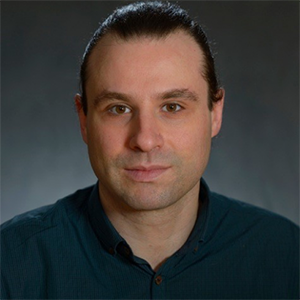
Luca Busino, PhD
Perelman School of Medicine at the University of Pennsylvania
Philadelphia, PennsylvaniaRelevance of ubiquitin dependent proteolysis in Diffuse Large B-cell lymphoma
The goal of this proposal is to investigate the significance of genes of the ubiquitin proteasome system (UPS) that are mutated in Diffuse Large B-cell Lymphoma (DLBCL). Our studies leverage the expertise in the molecular modeling of the UPS in the pathogenesis of DLBCL utilizing mouse models, patient derived xenotransplant (PDX) and cell lines. Our goal is the understanding of how genetic mutations contribute to disease development, progression and therapeutic outcome.
Program: Career Development ProgramProject Term: Start Date: July 1, 2022 End Date: June 30, 2027
Understanding the clonal origin, evolution, and progression of myeloid malignancies
The overarching focus of my research is to understand the clonal origin, evolution, and progression of myeloid malignancies and biological and clinical factors that influence the process. We tackle this question by analyzing patient samples with integrated approach combining single-cell omics, evolutionary genetics, and computational analytics. The ultimate goal of our research is to develop clinical strategies for early detection, prevention, and treatments of myeloid malignancies.
Program: Career Development ProgramProject Term: Start Date: July 1, 2022 End Date: June 30, 2027
Patient Experience Research and Palliative Care Integration in Malignant Hematology
My research aims to improve the patient and caregiver experience of blood cancer care. To achieve this, I conduct trials of integrated palliative care interventions. Palliative care improves patient and caregiver outcomes for those with solid tumors, but less is known about its role in hematology. My research aims to design and implement integrated palliative care interventions in blood cancer settings, to improve the patient and caregiver experience of illness, regardless of treatment outcome.
Program: Career Development ProgramProject Term: Start Date: July 1, 2022 End Date: June 30, 2027
Stratified treatment of newly diagnosed MCL based on the presence or absence of high risk features utilizing non-cytotoxic agents.
We believe that regimens without chemotherapy can induce significant and durable remissions in patients with Mantle cell lymphoma (MCL). We will confirm this hypothesis by conducting two clinical trials stratified by the presence or absence of high risk features. We will utilize BH3 profiling and MRD testing to assist with predicting treatment response and remission. Our goal is to verify the efficacy of our regimen and prove the utility of BH3 profiling and MRD testing in outcome prediction.
Program: Career Development ProgramProject Term: Start Date: July 1, 2022 End Date: September 30, 2027
Predictors of response to therapy in A051902, a US Intergroup study of duvelisib+CHO(E)P vs CC-486+CHO(E)P vs CHO(E)P in peripheral T-cell lymphoma
We are evaluating if adding duvelisib or azacitidine to standard chemotherapy increases the complete remission rate compared to chemotherapy alone in peripheral T-cell lymphoma. We believe that adding novel agents to chemotherapy will most benefit lymphomas with a T-follicular helper phenotype. We will also study if tests for lymphoma cells in the blood can predict outcomes. We hope these novel therapies will cure more patients and we can identify who is most likely to benefit from them.
Program: Career Development ProgramProject Term: Start Date: July 1, 2022 End Date: June 30, 2027
Improving Bispecific CD20/CD19 CAR T-cell Therapy to Overcome Resistance Mechanisms in B-cell Malignancies
The objective of this proposal is to improve bispecific anti-CD20/anti-CD19 CAR T-cell activity and persistence by understanding impact of cell manufacturing parameters on final engineered CAR-T product and determining resistance mechanisms in relapsing patients. We will analyze patient apheresis, final CAR-T product, and peripheral blood samples from subjects enrolled on an ongoing clinical trial (NCT04186520). Data from these studies will advance CAR T-cell therapies for lymphoma patients.
Program: Career Development ProgramProject Term: Start Date: July 1, 2022 End Date: June 30, 2027
Combination Targeted Therapy in Chronic Lymphocytic Leukemia
Targeted therapies have replaced chemoimmunotherapy in chronic lymphocytic leukemia (CLL). We previously reported that combined BTK inhibitor (ibrutinib) and BCL2 antagonist (venetoclax) is highly synergistic. In this proposal, we will conduct a phase II trial of combined non-covalent BTK inhibitor (pirtobrutinib) with venetoclax and obinutuzumab in patients with untreated CLL with primary endpoint of marrow MRD. We will perform BH3 profiling and scRNAseq and correlate with clinical outcomes.
Program: Career Development ProgramProject Term: Start Date: July 1, 2022 End Date: June 30, 2027
Early Detection and Intervention in Smoldering Multiple Myeloma: population-based screening and treatment; Edit-SMM
We build on the success from the Iceland Screens, Treats, or Prevents Multiple Myeloma (iStopMM) study, where over 80,000 consented to a nationwide screening for MM precursors. A unique cohort of patients with SMM diagnosed in iStopMM will be followed by clinical evaluation, linking to central health data registries, using novel biomarkers, and in-depth genetics. With precision early treatment we aim to induce a paradigm shift leading to improved quality of life and potentially a cure for MM.
Program: Career Development ProgramProject Term: Start Date: July 1, 2022 End Date: June 30, 2027
Deciphering the interplay between apoptotic and signaling pathways to target T-lineage acute lymphoblastic leukemia
T-ALL is an aggressive leukemia with limited treatment options. T-ALL cells resist to dying by suppressing their suicide pathways. BH3 mimetics reactivate the suicide mechanisms to induce cell death. We showed that these drugs are effective in T-ALL, but acquired resistance is due to the activation of growth-promoting signaling pathways. The proposed experiments will decipher the relationship between growth and death pathways, identifying unique combination therapies to improve disease outcomes.
Program: Career Development ProgramProject Term: Start Date: July 1, 2022 End Date: June 30, 2025
Defining the Biologic and Therapeutic Significance of the Novel Long Noncoding RNA MYND in Multiple Myeloma
Long non-protein coding RNAs (lncRNAs) are fundamental for proper cell function, but their purpose is poorly understood in multiple myeloma. To systematically identify myeloma-promoting lncRNAs, we integrated gene expression profiling of myeloma patients with high-throughput loss-of-function studies in cell lines. Moreover, we optimized strategies to antagonize myeloma-promoting lncRNAs, thus paving the way to developing lncRNA inhibitors as the next generation of therapy.
Program: Career Development ProgramProject Term: Start Date: July 1, 2022 End Date: June 30, 2024
Combined targeting of ATR and replicative stress in TP53-mutated AML
This research will test a promising new drug combination in acute myeloid leukemia (AML) carrying TP53 gene mutations, which is resistant to chemotherapy and has a median survival of less than 5 months. Our preliminary data show that TP53-mutated AML is selectively sensitive to the combination of an ATR inhibitor and decitabine. We will confirm activity of this novel drug combination using mouse models of leukemia and human AML samples and explore mechanisms of responsiveness.
Program: Career Development ProgramProject Term: Start Date: July 1, 2022 End Date: June 30, 2024
Mechanisms of Pathogenesis by MYB Fusions in Blastic Plasmacytoid Dendritic Cell Neoplasm
The transcription factor MYB has long been associated with leukemia, but how it contributes to disease is poorly understood. Fusions of MYB to other proteins, causing MYB activation, are found in patients with Blastic Plasmacytoid Dendritic Cell Neoplasm (BPDCN), but rare in other leukemias. I am using recently developed techniques to gain insight into how MYB fusions cause BPDCN. This will enable both new treatments for BPDCN and better understanding of the role of MYB in other leukemias.
Program: Career Development ProgramProject Term: Start Date: July 1, 2022 End Date: June 30, 2024
Defining PIK3R5-related PI3K gamma dependency as a novel therapeutic target in blood cancers including BPDCN
Blastic plasmacytoid dendritic cell neoplasm (BPDCN) is an aggressive blood cancer without adequate treatment. In a genome-wide CRISPR interference screen, BPDCN was highly dependent on the PI3Kγ pathway and specifically the PIK3R5 adaptor subunit. A subset of leukemias may share this vulnerability. We will interrogate the mechanism of this unique dependency and integrate PIK3R5/PI3Kγ targeting with leukemia therapy. Our goal is to provide novel treatments for PIK3R5-dependent malignancies.
Program: Career Development ProgramProject Term: Start Date: July 1, 2022 End Date: June 30, 2025
Mosunetuzumab with lenalidomide augmentation as first-line therapy for patients with follicular and marginal zone lymphoma
Dr. Olszewski’s trial will examine mosunetuzumab as a first-line treatment for follicular and marginal zone lymphomas—slow-growing types of B-cell lymphoma which remain incurable using current therapies. Mosunetuzumab is a “bispecific antibody” that can trigger an immune attack of patients’ own cancer-killing T-cells against the lymphoma. Dr. Olszewski team will look for characteristics that predict complete responses when this novel immunotherapy is applied as first-line treatment.
Program: Career Development ProgramProject Term: Start Date: April 1, 2022 End Date: March 31, 2027
SHP2 and BCL2 Inhibition in Acute Myeloid Leukemia
The goal of our work is to use a “bench to bedside and back” approach to develop new treatments for patients with relapsed/refractory AML. Through genetic analysis of patients who relapse or do not respond to standard and investigational treatments, we discover potential resistance mechanisms. In the lab, we test novel drugs and identify new drug targets that may address these resistance mechanisms when used in combination with other therapies. The overall goal of our research program is to improve treatment options and survival of patients with refractory AML.
Program: Career Development ProgramProject Term: Start Date: October 1, 2021 End Date: September 30, 2026
Blastic plasmacytoid dendritic cell neoplasm (BPDCN): understanding disease biology to improve therapy
We focus on blastic plasmacytoid dendritic cell neoplasm (BPDCN), an aggressive blood cancer with limited treatment options and poor outcomes. We want to understand what causes the disease, develop laboratory tools, and identify new treatments and ways to overcome therapy resistance. We have translated our discoveries to clinical trials. Our goal is to continue this bench to beside approach to develop the next generation of BPDCN therapies that improve survival and minimize treatment toxicity.
Program: Career Development ProgramProject Term: Start Date: October 1, 2021 End Date: September 30, 2026
Validation of Critical 1q21 Vulnerabilities in multiple myeloma
In previous studies of recurrently amplified 1q21 genes in myeloma, we identified ILF2 as a modulator of the DNA repair pathway, which promotes adaptive responses to genotoxic stress. Thus, ILF2 may have clinical utility as a biomarker of aggressive myeloma and blocking the ILF2-mediated repair signaling may enhance the effectiveness of current DNA-damaging agent-based therapies. We are seeking to determine the feasibility of therapeutically targeting ILF2 with antisense nucleotides and identify DNA repair effectors whose loss of function induces synthetic lethality in ILF2-depleted myeloma.
Program: Career Development ProgramProject Term: Start Date: July 1, 2018 End Date: June 30, 2023
Clinical investigation to improve efficacy of CAR-T Cell Therapy for Large B Cell Lymphoma
We are investigating new interventions that could improve the effectiveness of CAR T-cell therapy for lymphoma. A clinical trial will test radiation immediately followed by CAR-T. Larger lymphoma tumors are less likely to respond to CAR-T and we expect that radiation could reduce the amount of tumor, leading to improvement in responses. We will also conduct a series of trials to determine the effectiveness of vaccinations before and after CAR T cell therapy, and if anti-cancer vaccines could improve outcomes.
Program: Career Development ProgramProject Term: Start Date: January 1, 2021 End Date: December 31, 2025
Dissecting the heterogeneity of leukemic and pre-leukemic clonal expansion to identify genes associated with leukemia relapse and genesis
My research investigates the heterogeneity of leukemic and pre-leukemic clonal expansion to identify genes associated with leukemia relapse and genesis. Contrary to conventional studies analyzing cell mixtures, my research uniquely probes the specific cells underlying leukemia development. We expect to identify the key cellular and molecular events that drive leukemia onset and relapse. These findings will help improve diagnosis and can serve as new therapeutic targets for treating leukemia.
Program: Career Development ProgramProject Term: Start Date: July 1, 2019 End Date: June 30, 2024
Cellular Crosstalk In The Normal And Malignant Bone Marrow
We want to understand how leukemia inhibits blood production as this is one of the main causes of death in leukemia patients. We use new microscopy techniques developed by our group to image—for the first time—all types of blood cells and how they are eradicated by leukemia cells. Identification of the mechanisms through which leukemia inhibits blood production will be the foundation for new studies to develop drugs to maintain normal blood levels and prevent death in leukemia patients.
Program: Career Development ProgramProject Term: Start Date: October 1, 2021 End Date: September 30, 2026

Jeffrey Magee, PhD, MD
Washington University School of Medicine in St. Louis
St. Louis, MissouriNeonatal origins of pediatric AML
Coming soon.
Program: Career Development ProgramProject Term: Start Date: July 1, 2021 End Date: June 30, 2026
Cardioprotective Strategies and Cardiotoxicity Prediction in Children with Acute Myeloid Leukemia
We seek to reduce the adverse cardiac effects of chemotherapy in pediatric AML patients. We are assessing markers of heart function and injury to compare two clinical strategies for prevention of chemotherapy-induced heart injury. We are also developing a tool using these markers of heart function to characterize a child’s risk for cardiac dysfunction, which is critical to guiding safe chemotherapy delivery. By reducing the toxicity of therapy on the heart we hope to optimize delivery of effective chemotherapy and contribute to long-term leukemia cure without the burden of life-threatening heart disease during survivorship.
Program: Career Development ProgramProject Term: Start Date: July 1, 2019 End Date: June 30, 2024
Defining the role of DNA methylation modifier mutations in reshaping blood differentiation topology
Coming soon.
Program: Career Development ProgramProject Term: Start Date: July 1, 2021 End Date: June 30, 2026
Role of HLX in leukemia induction and maintenance
We and others have shown how HLX overexpression keeps blood cells more immature by blocking their differentiation and promoting their proliferation, a characteristic which is inherent to AML. However, whether there is a causative role of HLX in the induction of AML is still unclear. Hence, the aim of my study is to better understand, using genetically engineered mice models, retroviral models, and human AML patient samples, how HLX drives AML at molecular level. This study will uncover potential therapeutic strategies for AML treatment in future.
Program: Career Development ProgramProject Term: Start Date: April 1, 2021 End Date: March 31, 2024
Synergistic targeting of metabolic and epigenetic vulnerabilities in leukemia stem cells
Our lab is focused on identifying unique features that distinguishes acute myeloid leukemia (AML) stem cells from normal blood-forming stem cells. The cells that make more AML cells than others are called AML stem cells, and these cells need to be eradicated to achieve deep therapeutic responses. We believe targeting metabolism may achieve this goal and found strategies to target AML stem cell metabolism without harming normal stem cells. We hope that our study will lead to improved therapies against AML targeting metabolism to achieve deep remission with little toxicity.
Program: Career Development ProgramProject Term: Start Date: July 1, 2019 End Date: June 30, 2024

Thomas Koehnke, MD
Board of Trustees of the Leland Stanford Junior University
Palo Alto, CaliforniaThe role of truncating ASXL1 mutations in disease initiation and progression of human myeloid malignancies
N/A
Program: Career Development ProgramProject Term: Start Date: July 1, 2021 End Date: June 30, 2024
Targeting kinase-dependent dysregulation of transcription factor control in acute myeloid leukemia
Defining mechanisms of dysregulated gene control are central to understanding cancer and the development of effective therapies. Our research is focused on the mechanisms of gene control dysregulation in acute myeloid leukemia (AML), a refractory form of blood cancer that affects both children and adults. Using new methods for manipulating proteins, we are defining essential mechanisms by which AML cells enable cancer-causing gene expression. This work also allowed us to develop new drugs to specifically block this in cancer, but not healthy cells. Ongoing work aims to define precise mechanisms of cancerous gene control and develop definitive treatments for its control.
Program: Career Development ProgramProject Term: Start Date: July 1, 2019 End Date: June 30, 2024
Unfolding selective pathway dependencies of CALR mutated myeloproliferative neoplasms
The goal of this study is to selectively eradicate blood cancer cells carrying mutations in a gene called calreticulin. Genes and corresponding proteins required for cancer cell survival but not for the survival of healthy cells will first be targeted in mice, both genetically and by using drugs. Validated drugs will then be tested on patient samples. This study will lay the foundation to the development of tailored treatments for patients with calreticulin-mutated blood cancer.
Program: Career Development ProgramProject Term: Start Date: October 1, 2021 End Date: September 30, 2024

Daniel Pollyea, MD
University of Colorado Denver, Anschutz Medical Campus
Aurora, ColoradoTargeting Leukemia Stem Cells in the Clinical Setting: The Development of A Comprehensive Program
My focus is to develop a program in which novel therapies targeting leukemia stem cells (LSCs) are tested in clinical trials. This is achieved via partnership with laboratory-based colleagues who identify vulnerabilities in LSCs. Once recognized, we find or develop drugs to exploit these weaknesses through clinical trials for acute myeloid leukemia patients. The goal is to bring forward new therapies that result in deep and durable responses, which also have the potential to cure this disease.
Program: Career Development ProgramProject Term: Start Date: July 1, 2019 End Date: June 30, 2024
CAR T-cell therapy in central nervous system (CNS) lymphoma: a study in safety and efficacy and a model in which to study mechanisms of neurotoxicity
CAR T-cells are highly effective in lymphoma but limited by a profound and potentially fatal toxicity involving the central nervous system (CNS). Little is known about how CAR T-cells eliminate lymphoma cells in the CNS nor how this therapy causes toxicity. I will study CAR T-cells in patients with CNS lymphomas with the goal of expanding CAR T-cell indications. I will also examine serial blood and CNS samples to understand neurologic toxicity to inform new therapies to control this toxicity.
Program: Career Development ProgramProject Term: Start Date: October 1, 2021 End Date: September 30, 2026
Improving BTK Inhibitor Therapy in Chronic Lymphocytic Leukemia Through Rational Combination Strategies
Ibrutinib is a targeted oral treatment for CLL that is safe and highly effective, however it must be given indefinitely which leads to chronic side effects and allows resistance to develop. We are conducting two clinical trials that add a second drug to ibrutinib to eliminate the remaining leukemia or ibrutinib-resistant leukemia cells. If these trials are successful, people taking CLL with or without resistance may be able to stop treatment in remission after taking an ibrutinib combination.
Program: Career Development ProgramProject Term: Start Date: July 1, 2019 End Date: June 30, 2024
Cytokine induced memory-like NK cell immunotherapy to target post transplant relapse
Coming soon.
Program: Career Development ProgramProject Term: Start Date: July 1, 2021 End Date: June 30, 2026
Investigating the role of CREBBP mutations and epigenetic crosstalk in B-cell lymphoma
We seek to understand the genetic and epigenetic etiology of B-cell lymphoma and how deregulation of normal epigenetic programs perturb developmental programs and immune interactions. We approach this using a variety of genomic technologies to interrogate primary human tumors, CRISPR-engineered cell lines, patient-derived xenograft models and transgenic mouse models with different genetic lesions. We hope to understand how genetic and epigenetic changes associated with B-cell lymphoma create dependencies or characteristics that can be targeted through rational therapeutic interventions to improve patient outcomes.
Program: Career Development ProgramProject Term: Start Date: October 1, 2020 End Date: September 30, 2025
Targeting the interaction of leukemia stem cells with their niche to treat myelofibrosis
Bone marrow scar formation (fibrosis) is a hallmark of myelofibrosis and contributes significantly to the disease progression. We use mouse genetics to model myelofibrosis and understand the cellular and molecular makeup of the diseased microenvironment. We aim to understand the composition and alteration of the bone marrow microenvironment in myelofibrosis. This may provide novel therapeutic targets for myelofibrosis.
Program: Career Development ProgramProject Term: Start Date: July 1, 2019 End Date: June 30, 2024
A precision-based all-oral combination of venetoclax, oral decitabine, and IDH1/2 targeted inhibition for patients with IDH1 or IDH2 mutated AML
My ultimate goal is to develop more effective, better tolerated, and individualized treatment for patients with AML. This project focuses on AML patients with IDH1 or IDH2 mutations, with a clinical trial evaluating a combination of three agents which are effective in IDH-mutated AML. While these therapies are not curative on their own, my hope is that this combination will lead to a practice changing all-oral, outpatient, and well-tolerated curative strategy for patients with IDH-mutated AML.
Program: Career Development ProgramProject Term: Start Date: October 1, 2021 End Date: September 30, 2026

Alexey Danilov, PhD, MD
Beckman Research Institute of the City of Hope
Duarte, CaliforniaOvercoming ibrutinib resistance in mantle cell lymphoma
Mantle cell lymphoma (MCL) is an aggressive blood cancer which affects about 3,000 individuals in the United States annually. Despite advances of novel therapies in blood cancers, MCL remains incurable, and patients ultimately succumb to disease. We seek to evaluate longitudinal samples from patients with MCL treated with novel therapies to understand the mechanisms of drug resistance. We identify novel targets, with a particular focus on protein turnover pathways, to overcome drug resistance and improve survival of patients with MCL.
Program: Career Development ProgramProject Term: Start Date: July 1, 2018 End Date: June 30, 2023
Identification of novel therapeutic strategies for aggressive subtypes of CTCL
Coming soon.
Program: Career Development ProgramProject Term: Start Date: July 1, 2021 End Date: June 30, 2026
All-in-one for myeloma: a single therapy to combine CAR T cells and bispecific antibodies to engage both innate and adaptive immune responses
This project is designed to develop a novel cell therapy to treat relapse/refractory multiple myeloma (MM), an incurable cancer. We target BCMA, a protein highly expressed on MM compared to normal cells, with CAR T cells that also secrete a bispecific antibody that can engage all cytolytic cells, including various endogenous T cells, natural killer (NK) cells, and NKT cells to kill MM cells. We aim to complete all preclinical studies so that the therapy is ready for future clinical studies.
Program: Career Development ProgramProject Term: Start Date: July 1, 2018 End Date: June 30, 2023
Precision Medicine Inhibitor and Immunotherapy Approaches for High-Risk Childhood Leukemias
Dr Tasian’s scientific passion is successful development of precision medicine therapies for high-risk childhood leukemia. Her translational laboratory research program focuses upon investigation of kinase inhibitors and chimeric antigen receptor (CAR) T cell immunotherapies in childhood ALL and AML using primary patient specimens and patient-derived xenograft models. Through her laboratory and clinical research, she aspires to improve cure rates and minimize toxicities for children with leukemia.
Program: Career Development ProgramProject Term: Start Date: October 1, 2021 End Date: September 30, 2026
Discovery of Aging-Driven Mechanisms Causing Clonal Hematopoiesis (CH) and its Progression to Hematological Malignancy
My research focuses on why and how risk of acute myeloid leukemia (AML) increases with aging. Studying naturally aged mouse models in combination with mice engineered to express mutations commonly found in human blood stem cells with aging, we are investigating whether certain inflammatory factors that increase during aging increase the risk of leukemia. My goal is to identify biomarkers to assess risk of AML development in aging individuals and define new therapeutic targets to prevent AML.
Program: Career Development ProgramProject Term: Start Date: January 1, 2021 End Date: December 31, 2025
Targeting non-genetic mechanisms of therapeutic resistance in Acute Myeloid Leukaemia
Drug resistance in AML can develop via a non-genetic process which remains poorly understood. Using our novel cellular barcoding technology that can trace the growth of thousands of cancer cells, our research will identify genes that are switched on or off in AML cells that lead to drug resistance and relapse. This work will reveal the factors underpinning non-genetic drug resistance that may be targeted with new drugs to prevent relapse and ultimately improve quality of life and survival.
Program: Career Development ProgramProject Term: Start Date: October 1, 2021 End Date: September 30, 2024
Overcoming BTK Inhibitor Resistance in Chronic Lymphocytic Leukemia
Coming soon.
Program: Career Development ProgramProject Term: Start Date: April 1, 2021 End Date: March 21, 2026



